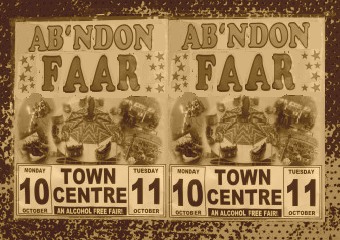
Fifty years ago or less, the speech of an Ab’ndonian would hardly have been understood by a person from the northern counties. and his dialect would sound strange to his grandson of today. He called a stone a “stwun”, a mole a “wunt”, – Wantage means the place of wunts – a pig a “peg”, and a sheep a “ship”.
He lengthened out his a’s so that yard became “yaard” and way “waay”. For “I am not” he said “I beant”, for “will you” he said “Oo’lt”. He would say “mwoast” and “mwoare” and “whum” and “wi”.
He used strange words like “unked” and “lear” and athert” where we would say uncanny, hungry, and across. “I” was used for me and myself, “he” for him, and “his’n” and “shis’n” for his and hers.
“B’ist thee a-gwaen to Ab’ndon faar? If thee b’ist I’ll see ‘ee theaar.”
(a short extract from ‘The School History of Berkshire’ by E.A. Greening Lamborn published in 1908 and no longer on the school history curriculum)
Use of ‘unked’ persisted in Abingdon speech for another half century, into the late 1950s at least. But those posters – your own design?
BTW, in my copy of the book, the reference is to “the speech of a Berkshireman”, not an Ab’ndonian; let us not forget the shameful shuffle of the town, originally the county town of Berkshire, into Oxfordshire in 1974.
My son and his friends (all aged around 18) still lengthen their ‘a’s in the way described in this article. As a Londoner by birth and upbringing, I find this quite endearing!
My grandfather used to quote an old gentleman who lived somewhere on Boars Hill who said things like” Bist thee goin’ a thert Muckles Hut?” To which the answer was “No, I bin goin’ a thert yonder”. Or something like that…Apparently Muckles Hut was an old cottage somewhere up there.
There still is a house called Muckle’s Hut on Boars Hill I think
Abingdon is indeed often spelled “Abendon”, reflecting the pronunciation, in early maps.
This is such an interesting piece, and you begin to see a little of the hinterland of the Abingdon accent. I’ve lived here for 17 years, and it’s fascinating to hear my sons’ growing and their accents beginning to evolve – the shortening of the ‘ing’ sound being the one I often notice.
As someone who speaks a bit of German, the parallels with ‘Ich bin’ and ‘du bist’ (for I am and you are) are also wonderfully intriguing. I’d love to know how that came about, or totally coincidental???